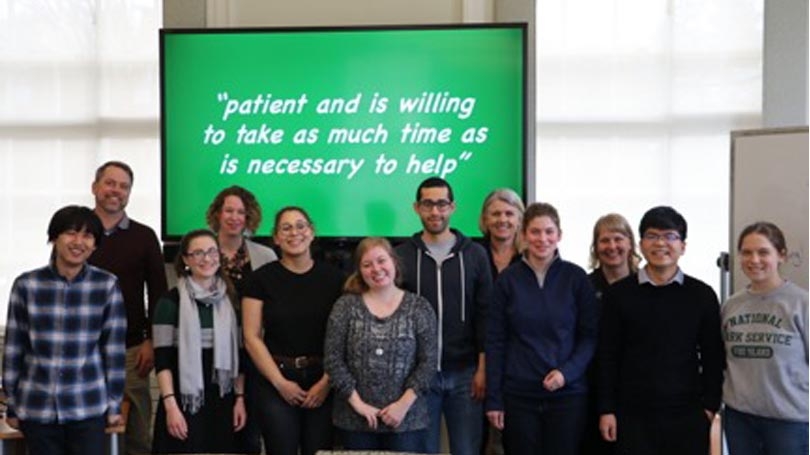Working with undergrads as a teacher or mentor provides unique benefits to graduate students, allowing them to develop their mentorship style and skills.
Effective undergraduate mentorship demands preparation, commitment, and time management from graduate students. In addition, graduate students function as the connective tissue between teaching professors or research principal investigators (PIs) and a diverse group of students. Day to day, graduate TAs must serve students—providing troubleshooting, guidance, and support—while remaining available to the professor to assist with course development and grading.
A mutual benefit for students and graduate TAs is the near-peer relationship between them: graduate students were recently learners in the same material and can relate to the struggle of navigating the course material for the first time while providing insights and strategies for success. On the other hand, mutual benefit flows between the graduate TA and the supervising professor by deepening their relationship while offering concrete opportunities to refine the graduate student’s classroom skills, expectations, and self-awareness.
This year, undergraduates who nominated graduate students described them as kind, patient, caring, enthusiastic, knowledgeable, and inspirational. “I really appreciate how he organized the course and lessons. He made good use of the classroom, working out examples on board and showing us theorems on the projector,” wrote one undergrad of her instructor. She further wrote that “he made himself extremely accessible and encouraged questions in class, and was very accommodative when scheduling office hours. He often stayed over if there were still lingering question, and made sure to follow up if he felt like he didn’t provide a comprehensive answer in office hours.”
In other letters, a group of undergraduates highlighted the ways in which a graduate TA had prepared and positioned them to succeed in the academic discipline at large. “She spent a large portion of time working with me personally to enrich my knowledge in the field for multiple academic terms. I am pleased to report that I still apply this knowledge in all my GIS work, from weekly lab assignments to my poster at the American Geological Union Fall meeting,” wrote one student. Another student “was immediately struck by not only her knowledge on the topic but her unique ability to empathize with the first-time learner without prompt.” Yet another student described her as “very approachable, patient, and willing and able to explain concepts clearly and in multiple ways, to both students with little to no science background and those with extensive STEM background. We continue to discuss our research often, and she gives me guidance on the process of applying to grad school.”
Many students appreciated the individual attention their graduate TAs provided. “He is super patient when it comes to research and is always willing to spend lots of time with me and others in our group writing code, discussing future steps, and ultimately, sharing what he knows to better our understanding of the questions at hand,” one student wrote. Other students appreciated a graduate TA’s ability to calibrate the level of detail, writing that “he was able to adjust very well to the level of whoever he's working with. Instead of assuming you know something, he is always careful to ask questions like "Have you learned this yet?" and "Does this make sense?" so that he knows where to start explaining.”
Graduate TAs demonstrated commendable dedication to the learning community and the undergraduates’ development in field courses. “She was an incredible teacher and mentor to us,” one student wrote. “She consistently went above and beyond for the students. She helped us with our work, but also took the time to teach us about her own work so that we could get excited about another subfield in ecology. She inspired us every day to work harder and to also have fun.”
In addition to hosting this celebration, DCAL is a valuable resource for graduate students, offering many courses and professional development workshops throughout the academic year. Cindy Tobery, DCAL Associate Director, notes the support of DCAL is open to grad students and postdocs from all disciplines who are interested in teaching in some way: “When you think about it, teaching is just one form of communication. If you are doing research, you need to be able to teach others about it – whether that is at a conference of peers with expertise or in a classroom of novices. DCAL can help someone figure out what’s needed to teach in many ways. However, what the undergraduates say about the grad students who received this recognition always reminds me that someone can know how to design lessons and know something about how people learn, but they need to work on being student-centered and really connect with their students to be considered an outstanding teacher.” Congratulations to all the mentors and TAs!
Graduate Teaching Assistants and mentors recognized at the 2019 lunch were:
Juan Auli – MATH 20
Evan Dethier – EARS research mentor
Chris Geiger – BIO 12
Nate Heller – PBS/Religion 41
Huanping Huang – EARS research mentor
Marina Kirkland – BIO 12
Becca Rossi – EARS 65, 33 and research mentor
Liz Studer – BIO FSP
Miao Tang – CHEM research mentor
Tamar Wheeler – BIO 12
